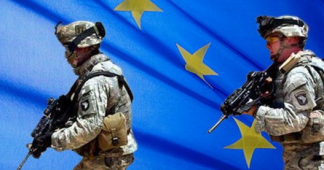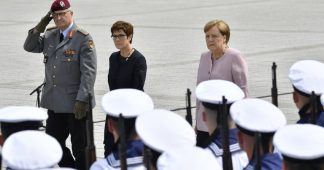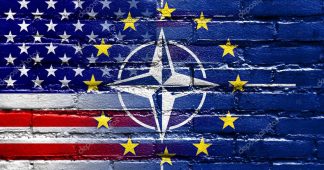By Jörg Kronauer
Junge Welt, 9 April 2021
Background Note
Dissatisfaction with the EU’s military activities characterized two discussion rounds recently held by the German Ministry of Defense together with the European Council on Foreign Relations (ECFR) and experts from Germany, France and Poland. There are increasing crises and wars around the EU, in regions that the Union more or less considers its “backyard” – and what does Brussels do? There are, ECFR noted in a report on the results of recent talks, fewer joint EU operations today than when the “Common Security and Defense Policy” was launched. Instead, more and more military operations are being conducted by “coalitions of the willing” outside the EU framework, such as the naval mission to protect merchant shipping in the Strait of Hormuz. France launched this on its own in early 2020 – partly because Germany declined to participate actively.
In discussions led by the Defense Ministry and ECFR, this was considered a serious problem. If military interventions were “not supported by the political will of the member states” and the Union was therefore “unable to respond to growing external demands,” then sooner or later “more and more member states would question the value of the Common Security and Defense Policy,” ECFR held. The EU would have to answer the question of what it really wants to provide – training missions like EUTM Mali? Comparatively low-threshold interventions? Combat operations, such as those carried out by France in the Sahel? Depending on the answer to this question, the EU would have to reorganize its claims and its practice. Nothing would be “more damaging to the credibility of the European bloc,” ECFR judged, than “a deepening of the already huge gap between the ambitious rhetoric and the reality” of EU military policy. (jk)
The much-cited Franco-German engine of the EU is sputtering audibly. Whether in the field of economics, where Paris wants to use its EU Council presidency from January 1, 2022 to finally “reform” the Stability Pact against the resistance of strong forces in Germany. Whether in the fight against the pandemic, in which the Federal Republic has now introduced systematic controls at the border with France for the second time within a year, thus triggering fierce resentment in the neighboring country: There is hardly a policy area in which there is not currently tension between the two most powerful states in the EU. This is not least the case where both countries really want to pull together to secure global political influence: in the field of armaments and military policy. Without independent arms manufacturers, without independent armed forces, there can be no “strategic autonomy”, no EU as a world power – there is agreement on this in principle on both sides of the Rhine. But only in principle.
Once again, there has been a fierce dispute over key joint armaments projects, especially the planned next, sixth-generation fighter jet. Not only is it to have all the capabilities of the U.S. F-35 stealth fighter (fifth generation), but it is also to fly in a satellite-controlled network with drones and drone swarms. The overall network is called FCAS (Future Combat Air System), and it is now a tri-national Franco-German-Spanish project.
Different interests
The fact that Madrid was involved was ultimately pushed through by Berlin in the face of opposition from Paris. The reason for the resistance was that the French defense company Dassault, which builds the Rafale fighter jet, is considered in principle capable of building the FCAS on its own, unlike Airbus. Accordingly, Dassault in particular resented having to share the profitable work on the new fighter jet not only with German but also with Spanish companies. As recently as March, Dassault was said not to rule out going it alone. On Good Friday, the French Defense Ministry confirmed that the companies involved had found a joint solution. Whether it will hold – who knows.
This is by no means the only dispute over an important armaments project. There is also trouble with the so-called Eurodrone, which Germany and France want to build together with Spain and Italy: The project is dragging along, is about to sign the contract after some six years of official preliminary negotiations – and Paris is anything but satisfied with the state of affairs. Berlin wants a drone that has two engines, supposedly for security reasons. However, this would make it considerably heavier and also more cumbersome than, say, the single-engine U.S. “Reaper” drone, one of the standards in the industry. This does not fit in well with Paris’ plans to be able to flexibly deploy the Eurodrone in an armed variant in wars in French-speaking African countries, for example, and also to make it attractive to potential export customers. Annoyed that the German side had once again prevailed, the French journal Aerospatium stated in February that Berlin and Paris did not have “the same vision of the world” and were therefore pursuing different interests; the question was whether genuine “defense cooperation was impossible.”
In addition, there are still smoldering differences over foreign deployments. Take Mali, for example: Paris is urgently seeking support for its combat forces in the country or throughout the Sahel. To this end, the French government had already announced in June 2019 that it would form a “Taskforce Takuba” with 500 elite soldiers from the EU to train special forces from the Sahel states. Berlin, as usual anxious not to place German soldiers under French command if possible, is not participating and has also stirred up opposition to the project. At the beginning of the year, not even 200 military personnel were on the ground in the “Takuba” framework.
Differences at NATO
Of course, this is not something to regret. But it does show that Berlin and Paris are not pulling in the same direction in terms of military policy. Another example: Germany is trying to bring the armed forces of the EU states together in close cooperation through the “Pesco” project. The goal is an “army of Europeans,” but only in the long term. France, on the other hand, is in a hurry and is seeking to speed up military cooperation, which is why it created the European Intervention Initiative back in 2018. Neither project has yet achieved any striking successes.
Last but not least, there are still differences on the question of how the relationship with NATO should be shaped. While Berlin believes that it will continue to rely on the transatlantic alliance for quite some time, Paris is in a much greater hurry to achieve “strategic autonomy” for the EU and is openly critical of NATO. In November 2019, President Emmanuel Macron even certified it as “brain dead,” which was met with indignant displeasure in Berlin at the time. Most recently, an open letter to NATO Secretary General Jens Stoltenberg in mid-March caused debate, written by the Cercle de réflexion interarmées, an association of retired generals and officers of the French armed forces. The military officers warn that the closer political cooperation in NATO that some have called for amounts, above all, to putting Europe in permanent antagonism with Russia and, in effect, “under American tutelage.” They oppose this, and more vehemently than Germany does: Further friction between Berlin and Paris is also emerging in this regard.











